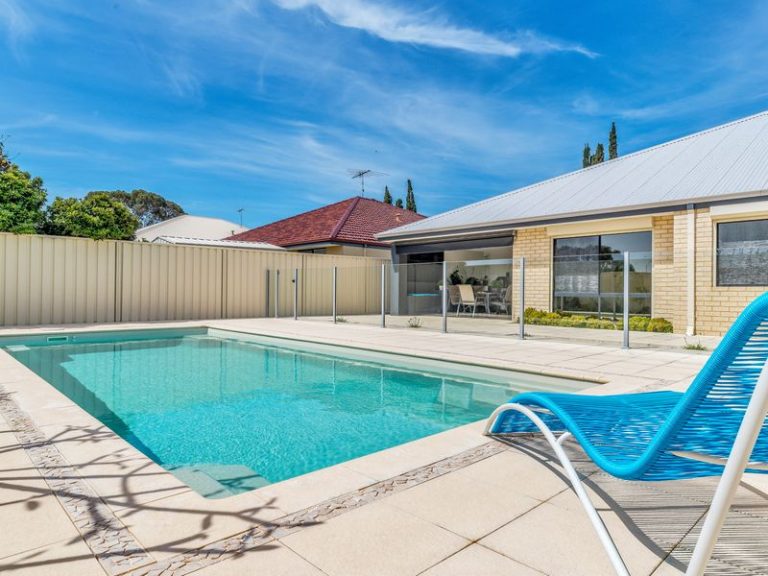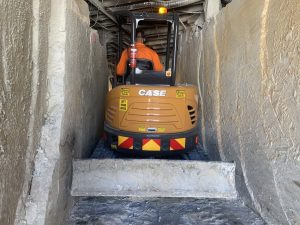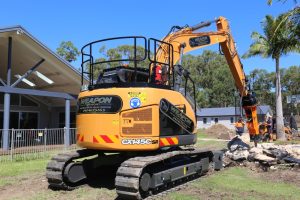
Building an in-ground pool requires proper planning and execution to achieve that perfect design and guaranteed safety for your property. Having the right earthmoving machines, attachments, budget and team supporting you is essential to the pool’s construction.
What machinery is used to dig a pool?
Excavators play a huge role in building a pool, unless you’re planning to dig by hand. A typical project in a residential area will involve using a track mounted excavator or mini excavator. If foliage or bush is obstructing your digging area, land clearing machinery will be required to clear the land. Skid steers and track loaders also come in handy when carting soil to a dump truck to remove from the site.
What size of excavator do I need to dig a pool?
When considering what size excavator will suit your pool, it’s important to note the ease of access to the construction site. If construction is taking place on a large property, with no access issues, using a 14-tonne excavator, like the Case CX145C, or larger model will be more efficient and less costly. Tracked excavators will provide the traction and safety required on soft or bumpy soil. However, if you are installing a pool on a suburban block or residential area with narrow access, smaller machines will be required. A 5-6 tonne mini-excavator is perfect for these types of sites.

What attachments will I need?
A full set of excavator buckets, especially a GP bucket, will help ensure you are prepared for whatever type of soil and rock you encounter on your site. A GP bucket’s teeth are perfect for breaking up the ground for easier penetration.
Utilising a sieve bucket will also be handy. Sieve buckets are used widely in the civil construction industries for separating soil from debris like roots, rocks and bricks. They assist in allowing workers to retrieve materials which can be reused on site later. This will be useful if you plan on backfilling parts of the hole.
If you are planning to refurbish an old or existing pool, a rock hammer will be perfectly suited for breaking up tiles and concrete. Ensure your excavator has the proper hydraulic flow requirements for using a rock hammer to maximum effect.

Basic Pool Install Procedures
After you’ve created a sketched plan and marked out the pools area, the first step is digging small holes to determine what types of soil you will be digging through.
After the digging process, the excavated soil is hauled away from the site by truck. If backfilling of the hole is required, some of the soil will be left at the site for use later.
After the hole for the pool has been dug, the actual install of the pool can occur. This process will differ depending on if you’re installing a fibreglass pool or concrete pool. Both processes will involve plumbing work and completing electric work.
Can I build a pool by myself in Australia?
In theory, it is possible to build a pool by yourself in Australia. However, it is almost always better to hire a professional because of the licensing and skill requirements. An above-ground pool is more feasible since it does not require excavation.
You would need to rent an excavator for an in-ground pool project. Operating this machinery requires a valid excavator license.
For a do-it-yourself pool, you will also need the knowledge and skills to pre-fit the plumbing and electrical systems, such as those necessary for a heated pool. Finally, you will need equipment and skills to lift the fibreglass shell into place or build the frame and pour the cement.
If you feel like you have everything necessary for the job, you can dry hire the equipment. This cost-effective option allows users to hire equipment that they then operate and fuel on their own. The opposite is a wet hire, which includes all consumables and a licensed operator.
How much does it cost to build an inground pool in Australia?
To calculate the cost of an inground pool, you need to add the price of each step of the process.
Digging and excavation costs will vary depending on the size, shape, and location of the pool. On average, you can expect to pay between $70 and $150 per hour for excavation service. That typically adds up to $500 to $3,000, with most projects taking one to three days to complete.
Complex projects, such as large pools, pools with unusual shapes, or pools that require grading the land or digging near a structure can increase the price.
The cost of the installation of the pool itself depends on the type of material.
Concrete pools are generally more expensive than those made with a fibreglass shell. Concrete designs can range from $35,000 to $100,000, depending on size, depth, and shape. Fibreglass pools are $25,000 to $75,000.
Fibreglass pools are $10,000-$25,000 cheaper than concrete, on average. Though it is durable enough for most home pools, the designs are more limited than concrete. This means you need to select from a finite number of size and shape options.
Added costs not related to the actual digging and installation of the pool include:
- A pump and filter system
- A safety fence
- Any engineering and surveying costs to determine the placement of the pool
Adding all these costs together can save you from a surprise when it is time to add the final price of the project.
Why should I hire a contractor to build my pool in Australia?
A contractor can bring professional skills and experience to a pool project. Furthermore, they can hire specialists for every aspect of the job. Even if you have the licenses and professional skills to operate all the equipment needed for an in-ground pool, you will not have expert-level skills in every aspect of the project. A contractor can bring the quality assurance that comes from having professionals handle every step in the process.
Because of this confidence in quality, contractors may offer a guarantee and provide follow-up service if repairs are necessary within a specific timeframe. With these guarantees in place, you can be confident that the structure will last for a long time without needing repair.
Contractors can handle every aspect of the pool construction. This makes it easier to arrive at a final cost. You will not get surprised by unexpected expenses that you didn’t consider. If you have a finite budget, this is an important benefit of working with a professional pool builder.
Finally, if family members are using the pool, you want to be sure that the structure and its elements are safe and stable. Finding a contractor with a track record of successful projects can provide peace of mind that your pool will be safe for your loved ones to use.

